
Natural Resources
Conservation Service
Ecological site F115XB016MO
Sandstone Upland Woodland
Accessed: 12/22/2024
General information
Provisional. A provisional ecological site description has undergone quality control and quality assurance review. It contains a working state and transition model and enough information to identify the ecological site.
Figure 1. Mapped extent
Areas shown in blue indicate the maximum mapped extent of this ecological site. Other ecological sites likely occur within the highlighted areas. It is also possible for this ecological site to occur outside of highlighted areas if detailed soil survey has not been completed or recently updated.
MLRA notes
Major Land Resource Area (MLRA): 115X–Central Mississippi Valley Wooded Slopes
The Central Mississippi Valley Wooded Slopes, Western Part (area outlined in red on the map) consists mainly of the deeply dissected, loess-covered hills bordering the Missouri and Mississippi Rivers as well as the floodplains and terraces of these rivers. It wraps around the northeast corner of the Ozark Uplift, and constitutes the southern border of the Pre-Illinoisan-aged till plain. Elevation ranges from about 320 feet along the Mississippi River near Cape Girardeau in the south to about 1,020 feet on the highest ridges near Hillsboro, MO in the east. Local relief varies from 10 to 20 feet in the major river floodplains, to 50 to 100 feet in the dissected uplands, with bluffs of 200 to 350 feet along the Mississippi and Missouri Rivers. Underlying bedrock is mainly Ordovician-aged dolomite and sandstone, with Mississippian-aged limestone north of the Missouri River.
Classification relationships
Terrestrial Natural Community Type in Missouri (Nelson, 2010):
The reference state for this ecological site is most similar to a Dry-Mesic Sandstone Woodland.
Missouri Department of Conservation Forest and Woodland Communities (MDC, 2006):
The reference state for this ecological site is most similar to a Mixed Oak Woodland.
National Vegetation Classification System Vegetation Association (NatureServe, 2010):
The reference state for this ecological site is most similar to a Quercus alba - Quercus stellata - Quercus velutina / Schizachyrium scoparium Woodland (CEGL002150).
Geographic relationship to the Missouri Ecological Classification System (Nigh & Schroeder, 2002):
This ecological site occurs primarily in the Inner Ozark Border Subsection, in the following Land Type Associations:
Perry Oak Savanna/Woodland Dissected Plain
Meramec Highlands Oak Woodland/Forest Rugged Hills
Ecological site concept
NOTE: This is a “provisional” Ecological Site Description (ESD) that is under development. It contains basic ecological information that can be used for conservation planning, application and land management. After additional information is collected, analyzed and reviewed, this ESD will be refined and published as “Approved”.
Sandstone Upland Woodlands (green areas on the map) are in a few scattered upland locations in the Mississippi River watershed, not adjacent to the Mississippi River floodplain. Soils are typically moderately deep over sandstone bedrock, with an abundance of sandstone fragments in the subsoil. The reference plant community is woodland with an overstory dominated by white oak, with minor amounts of black oak and post oak, and a ground flora of native grasses and forbs.
Associated sites
| F115XB005MO |
Loamy Upland Woodland Loamy Upland Woodland sites underlain by sandstone are often upslope. |
|---|---|
| F115XB017MO |
Sandstone Protected Backslope Forest Sandstone Protected Backslope Forest sites are typically downslope on northerly and easterly aspects |
| F115XB051MO |
Sandstone Exposed Backslope Woodland Sandstone Exposed Backslope Woodland sites are typically downslope on southerly and westerly aspects. |
| R115XB052MO |
Shallow Sandstone Backslope Glade/Woodland Shallow Sandstone Backslope Glade/Woodland sites are usually closely associated with this site |
Similar sites
| F115XB016MO |
Sandstone Upland Woodland There are no similar ecological sites. |
|---|
Table 1. Dominant plant species
| Tree |
(1) Quercus alba |
|---|---|
| Shrub |
(1) Vaccinium pallidum |
| Herbaceous |
(1) Schizachyrium scoparium |
Click on box and path labels to scroll to the respective text.

